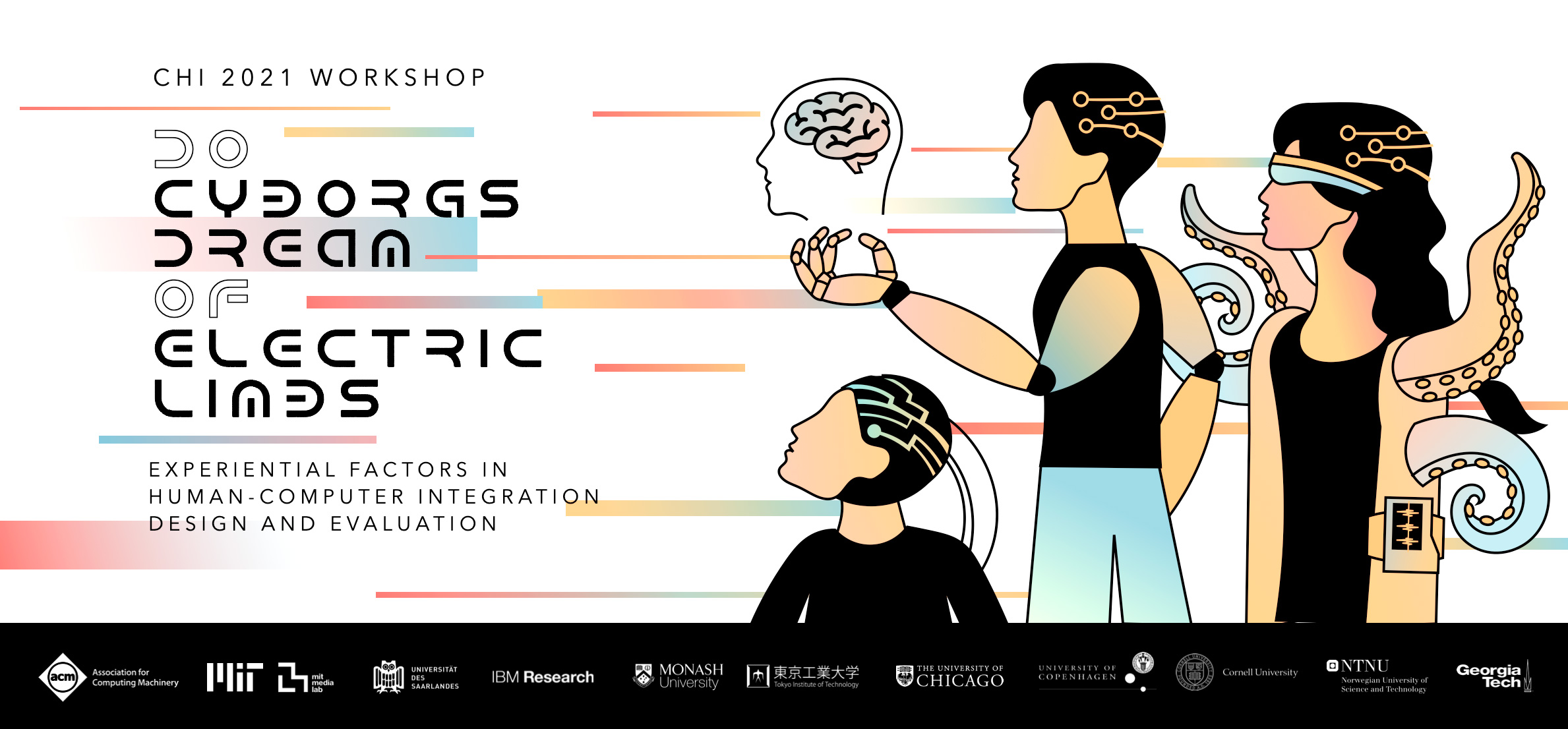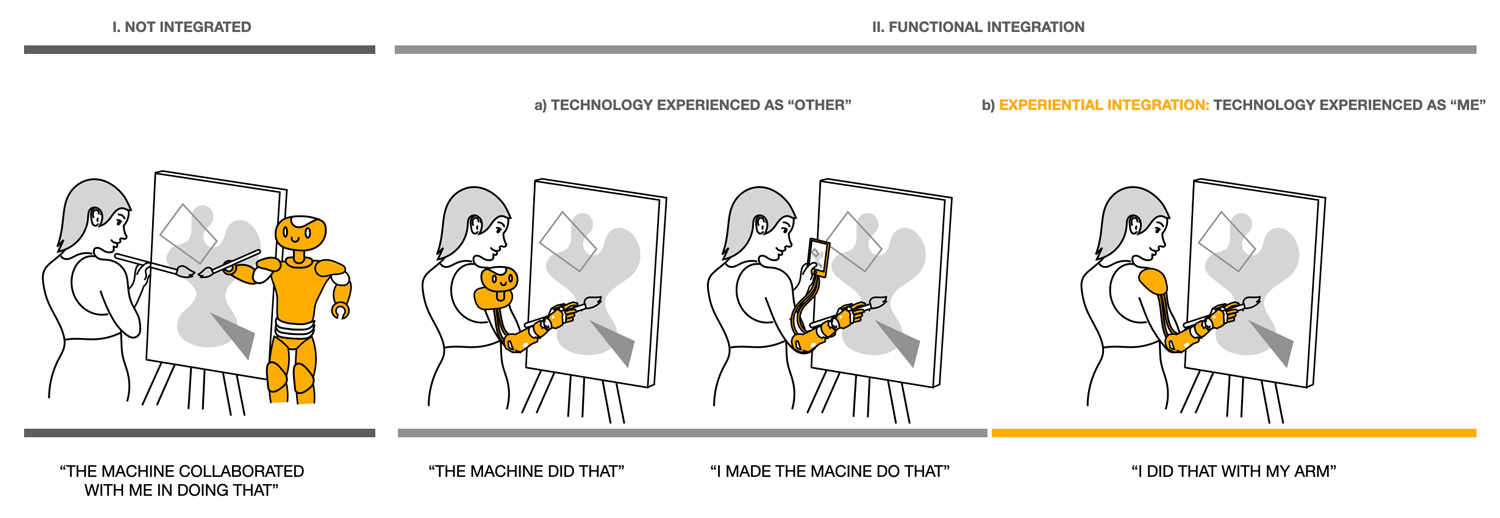
Do Cyborgs Dream of Electric Limbs?
A CHI 2021 Workshop on Experiential Factors in Human-Computer Integration Design and Evaluation
Saturday May 15, 2021 | 17:00-21:00 EST / 23:00-03:00 CET
While many systems have successfully demonstrated functional integration of humans and technology, little attention has been paid to how technologies might experientially integrate to feel as part of humans. Having a strong sense of self has been shown to increase body-protective behavior, intuitive functioning and body co-ordination – while a diminished sense of self has been linked to various disorders of consciousness like schizophrenia, somatoparaphrenia and depersonalization. Experiential integration would thus not just allow artificial modifications to be felt like a natural part of the body but also provide positive functional and psychological benefits.
Our aim is to shed light on the importance of experiential integration and provide researchers with a scientifically driven foundation for future designs and investigations. The workshop will consist of hands-on experiments with novel body-illusions, discussions on experiential integration, and instructor-guided sessions on psychological concepts related to the design and evaluation of experiential integration.
What is Experiential Integration?
In spite of new opportunities for increasing human performance, accessibility, and experience overall, we see limitations in current research on Human-Computer Integration. First, research on Human-Computer Integration is mostly a technical enterprise in that it is primarily concerned with the ‘physical form-factor’ and ‘performance measures’ of integration.
However, for humans to successfully integrate with computers it is not sufficient to only think about ‘physical integration’. An exoskeleton might for instance be able to move a user’s fingers to make their body play the piano effortlessly while still not providing them with a sensation that those actions were “done by me”, or a prosthetic limb might help the user to walk effortlessly while not providing the user with a sensation that “the prosthesis is part of me” . If we are to experience the computer as “part of us”, we must therefore also consider ‘experiential integration’, that is, how a technology might be experienced as a natural part of the user’s body.
Workshop Structure
|
Opening and Keynote |
45 minutes |
| Experiential Integration Introduction | 30 minutes |
| Break | 15 minutes |
| Exercise Part 1 | 30 minutes |
| Exercise Part 2 | 30 minutes |
| Break | 15 minutes |
| Participant Research Presentation | 1 hour |
| Cookbook Discussion | 45 minutes |
| Break | 15 minutes |
| Summary, future directions, closing | 45 minutes |
Keynote Speaker
Dr. Frédérique de Vignemont
Dr. Frédérique de Vignemont is a CNRS researcher and Deputy Director of the Jean Nicod Institute in Paris. She is the recipient of the 2015 Young Mind & Brain prize. Among her many publications, she is the author of Mind the Body: An Exploration of Bodily Self-Awareness (Oxford University Press, 2018) and co-editor of The Subject’s Matter (MIT Press, 2017). Her work extensively covers the philosophy and cognitive science of artificial limbs, bodily awareness, embodiment, the relationship between self and other, and more. “


Workshop Goals
The workshop’s primary goals are:
- to serve as an enduring community and discussion platform for researchers whose work focuses on the technologies that impact “self-hood”
- articulate the first-person aspects of self-integrated systems in forms of experience and examples
- understand forthcoming issues of designing and evaluating self-integrated systems
- discuss the ethical implications of integration with technology
- consider experiential boundaries, fragility of self-concept, disorders in which pre-reflective awareness and derealization are implicated
- extend the collaborative research and community engagement through building new research programs.
Topics
Major topics discussed in the workshops include
- “Sense of Body-ownership” and a “Sense of Agency” over a body-integrated computer
- Neurocognitive and Phenomenological sciences of HCI
- Theory of experiential integration
- Design and Implementation for experiential integration technologies
- Evaluation methods for experiential integration
Call for Participation
If you are interested in the workshop, please submit your application below. The submission deadline is February 7th, 2021. We will notify the accepted participants by the end of February, 2021 and with a maximum of 30 participants. The list of participants will be posted on the workshop website:
The workshop Do Cyborgs Dream of electric Limbs? focuses on the prospective of Human-Computer Integration, and discuss the matters of human factors, cognitive science, and ethical considerations around the topic. Cognitive and psychology research reveals different levels of body awareness and how these can be induced or designed upon. We focus on how to realize and evaluate experiential integration with technology. While many systems have successfully demonstrated functional integration of humans and technology, little attention has been paid to the experiential sense of self in such integration, in particular, how an integration might feel as part of the user.
The workshop discusses the idea of experiential integration, align it with evidence from cognitive science, and discuss its implications for Human-Computer Integration design and evaluation. The workshop activities consist of hands-on experiments with novel body-illusions, discussions on an experiential integration cookbook, and instructor-guided sessions on how to design and evaluate experiential integration for each participant’s research topics.
Experiencing Experience Exercises
In order to introduce the various aspects of experiential integration, the workshop will consist of particular activities and techniques which modulate (i) Reflective and Pre-reflective Self-awareness, (ii) Sense of Body-ownership, and (iii) Sense of Agency. The exercises design wil be based on the works of organizers and artist Carsten Höller who is known for the “Upside-down Glasses,” that is a scientifically driven art experience exploring the modification of visuo-motor experience.
Reflective and Pre-reflective Self-awareness
To show the distinction between reflective and pre-reflective body-awareness, we will utilize a “Mirror Tracing Task”. In a mirror tracing task, the participants will use a pen to follow a line from one end to the other (while the line twists and turns) only using a mirror. The participants are unable to see their own hand directly and thus have to use the mirror to coordinate their body movements. This forces the participants to rely on a reflective awareness of their hand to coordinate movements — and thus it acts as an example of the contrast between implicit pre-reflective body-awareness and reflective body-awareness in normal healthy individuals.
Sense of Body-ownership and Agency
To exemplify sensation of body-ownership, we will utilize variations of the “Rubber hand illusion” and “sixth finger illusion” . These experiments explore an alternative limb being felt as a part of oneself. Specifically, the experiments will be designed to be progressively experienced as a part of one’s body through various techniques such as visuo-tactile induction, moving from reflective to pre-reflective senses of ownership. We will contrast the sense of agency from ownership through another set of experiments. For instance, the wire hanger illusion will be used to illustrate an illusory force or reflex when one wears a wire hanger on the head. Through a sequence of task, participants will grow from reflectively conducting motor tasks towards pre-reflectively completing those.
Workshop Organizers
Important Dates
- Submission deadline : February 15th, 2021
- Notification of acceptance : March 8th, 2021
- Workshop date : May 15th, 2021
Accepted Participants
- Xiang Li, Exertion Games Lab, Monash University
- Mary Etta West, University of Colorado Boulder
- Haoran Xie, Japan Advanced Institute of Science and Technology
- Urba Mandrekar, Illinois Institute of Technology
- Aiden Kang, Tufts University
- Filippo Sanzeni, Royal College of Art (London)
- Ayesha Dawood, Ayesha Dawood Attorneys
- Cristina Zabalaga, Author
- Uzeyir Arda Ener, Turkish Airlines, All Civil Aviators Association
- Chase Philip, University of Houston
- Greta Riboli, Sigmund Freud University
- Xiaoyi Bao, Shanghai Jiao Tong University
- Hamidreza Maymandi, Instituto Politécnico Nacional-IPN México
- Isabella Hillmer, Sommelière
- Catalina Saini, Laboratory for Brain-Machine Interfaces and Neuromodulation, Pontificia Universidad Católica de Chile
- Penny Papageorgopoulou; Department of Communication & Media Studies, National and Kapodistrian University of Athens
- Brian Demczyk
- Cedric Honnet, MIT Media Lab
- Abigail Irwin, Bradley University, John Deere
- Divyanshu Tiwari, Indian Institute of Technology Roorkee
- Mariona Ruiz Peris, Imperial College London & Royal College of Art
- Kelsey Cotton, KTH Royal Institute of Technology
- Louise Petersen Matjeka, Norwegian University of Science and Technology
- Vitor Lima, Schulich School of Business, York University
- Jarrod Knibbe, University of Melbourne
- Borou Yu and Jiajian Min, MYStudioLLC
- Elijah Ko, Imperial College London & Royal College of Art
- Nihar Sabnis, Technische Universiteit Delft
- Thomas Chen, Academy for Mathematics, Science, and Engineering
- Rand Hidayah, Robotics and Rehabilitation Laboratory, Columbia University
- Christal Clashing, Exertion Games Lab, Monash University
- Nik Provenzano, University of British Columbia
- Emese Papp, Industrial Design Engineering, Technische Universität Dresden
- Lisa Marie Lüneburg, Technische Universität Dresden

